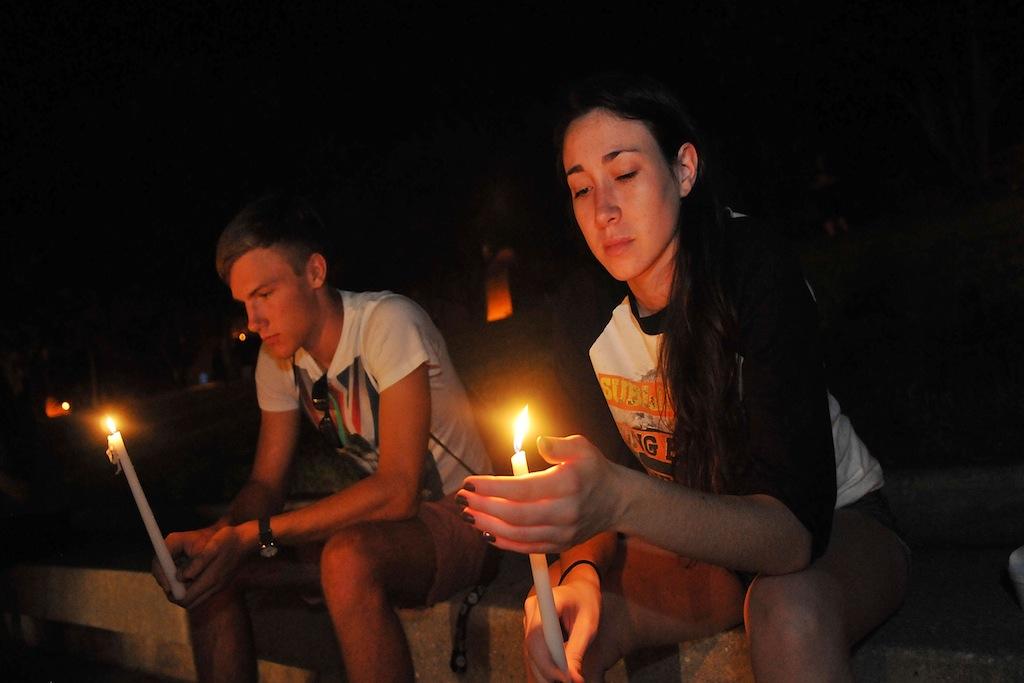The faith of James Foley and Steven Sotloff
University of Central Florida students Alastair Baines and Johanna Hauck hold candles during a candlelight vigil held for journalist Stephen Sotloff on September 3, 2014 in Orlando, Florida. Sotloff, a journalist taken captive in Syria, was murdered by Islamic fundamentalists in a video released last week.
JERUSALEM — In what first appeared to be a side note to catastrophe, the world learned after their violent deaths that both James Foley and Steven Sotloff managed to spirit letters out to their families while in captivity.
The content of these letters is anything but tangential, like the many acts of faith we now understand both men undertook before their murders by the Islamic State.
In a letter Foley dictated to a fellow hostage, who memorized the text, he said: "I know you are thinking of me and praying for me… I feel you all especially when I pray. I pray for you to stay strong and to believe. I really feel I can touch you even in this darkness when I pray."
Sotloff, agonizingly aware of the peril he was in, wrote his parents a letter that was read out loud at his memorial service on Friday: "I love you, miss you, pray for you and hope to see you soon… If we're not together again, perhaps God will be merciful enough to reunite us in Heaven."
This is not the sort of language commonly heard in the Middle Eastern cafés and hostels where jaded journalists gather, so often while covering disasters brought on by militant, distorted or jagged interpretations of religious faith.
But journalists Foley and Sotloff both belonged to vibrantly religious families, which even in their plain conventionality is unusual in the sphere of foreign correspondents.
Foley grew up a New England Catholic through and through, part of a devout family and community in Rochester, New Hampshire.
Sotloff grew up Jewish in the Miami area. His mother is a pre-kindergarten teacher at the family's local synagogue in Pinecrest, Florida. Sotloff was educated there and then worked there before taking on the wider world.
Foley, the product of a Jesuit education, and Sotloff, who apparently devised a way to fast on Yom Kippur and pray facing Jerusalem even under the eyes of his captors, are being remembered as men who connected their respective faiths with a sense of journalistic mission.
In light of this knowledge, it becomes impossible to dismiss the words of their letters as uncharacteristic sentiments formulated in extremis.
In an essay published in the alumni magazine of Marquette University, Foley wrote that during his previous 44-day captivity in Libya in 2011, "I began to pray the rosary. It was what my mother and grandmother would have prayed. I said 10 Hail Marys between each Our Father. It took a long time, almost an hour to count 100 Hail Marys off on my knuckles. And it helped to keep my mind focused."
He said fellow captive journalist Clare Morgana Gillis "and I prayed together out loud. It felt energizing to speak our weaknesses and hopes together, as if in a conversation with God, rather than silently and alone."
He prayed out loud.
In a letter the Sotloff family received only four months ago, Steven Sotloff, the grandson of Holocaust survivors, wrote: "Everyone has two lives; the second one begins when you realize you only have one."
Was he citing Viktor Frankl, the Holocaust survivor and philosopher who devoted much of his life to untangling the meaning of God in extreme circumstances? Frankl, in his 1946 book “Man's Search for Meaning,” counseled his fellow man to "Live as if you were living a second time, and as though you had acted wrongly the first time."
Frankl also wrote, "The way in which a man accepts his fate and all the suffering it entails, the way in which he takes up his cross, gives him ample opportunity — even under the most difficult circumstances — to add a deeper meaning to his life."
It appears that this is what Foley and Sotloff managed to do, however difficult. Getting a memorized message of faith out to family. Standing straight, even when forced to kneel. Figuring out which of the dark days of captivity is Yom Kippur.
Of all the markers that define us — age, sex, build, skin tone, ethnicity, possibly nationality — faith is by its nature the most hidden. Who can ever know what is inscribed on the heart of another? Secreted away from the world, Foley passed along the carefully assembled words of a letter; Sotloff hid a fast of atonement.
Not writing. Not eating. Acts of faith and deprivation the world has learned about after their deaths. Swallowed by darkness, returned to the light posthumously.
It is almost impossible to think of James Foley and Steven Sotloff and not touch one's own uncovered neck.
Every day, reporters and producers at The World are hard at work bringing you human-centered news from across the globe. But we can’t do it without you. We need your support to ensure we can continue this work for another year.
Make a gift today, and you’ll help us unlock a matching gift of $67,000!
